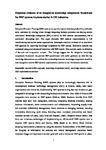Empirical evidence of an integrative knowledge competence framework for ERP systems implementation in UK industries
| dc.contributor.author | Jayawickrama, U | en |
| dc.contributor.author | Liu, S | en |
| dc.contributor.author | Hudson Smith, M | en |
| dc.date.accessioned | 2016-08-25T16:47:30Z | |
| dc.date.issued | 2016-10 | en |
| dc.identifier.issn | 0166-3615 | en |
| dc.identifier.other | C | en |
| dc.identifier.uri | http://hdl.handle.net/10026.1/5381 | |
| dc.description.abstract |
Enterprise Resource Planning (ERP) systems can greatly improve business productivity and better serve customers by creating values through integrating business processes and sharing current information. Knowledge Management (KM) is crucial for ERP systems implementation, but is particularly demanding task. This paper discusses ERP systems implementation in UK manufacturing and service sector organisations, focusing on empirical evidence of an innovative KM approach for improving knowledge competence for ERP success. Qualitative research was conducted, using semi-structured interviews with ERP experts. Data analysis used a combination of thematic and comparative analysis. The findings suggest that the integrative knowledge competence framework can provide ERP practitioners with useful guidance on what the key knowledge determinants are and how the relationships between knowledge components should be best managed to achieve ERP systems implementation success in real life business situations. | |
| dc.format.extent | 205 - 223 | en |
| dc.language.iso | en | en |
| dc.title | Empirical evidence of an integrative knowledge competence framework for ERP systems implementation in UK industries | en |
| dc.type | Journal Article | |
| plymouth.volume | 82 | en |
| plymouth.publication-status | Accepted | en |
| plymouth.journal | Computers in Industry | en |
| dc.identifier.doi | 10.1016/j.compind.2016.07.005 | en |
| plymouth.organisational-group | /Plymouth | |
| plymouth.organisational-group | /Plymouth/Faculty of Arts, Humanities and Business | |
| plymouth.organisational-group | /Plymouth/Faculty of Arts, Humanities and Business/Plymouth Business School | |
| plymouth.organisational-group | /Plymouth/REF 2021 Researchers by UoA | |
| plymouth.organisational-group | /Plymouth/REF 2021 Researchers by UoA/UoA17 Business and Management Studies | |
| plymouth.organisational-group | /Plymouth/Users by role | |
| plymouth.organisational-group | /Plymouth/Users by role/Academics | |
| dcterms.dateAccepted | 2016-07-20 | en |
| dc.rights.embargodate | 2018-08-03 | en |
| dc.rights.embargoperiod | Not known | en |
| rioxxterms.versionofrecord | 10.1016/j.compind.2016.07.005 | en |
| rioxxterms.licenseref.uri | http://www.rioxx.net/licenses/all-rights-reserved | en |
| rioxxterms.licenseref.startdate | 2016-10 | en |
| rioxxterms.type | Journal Article/Review | en |


